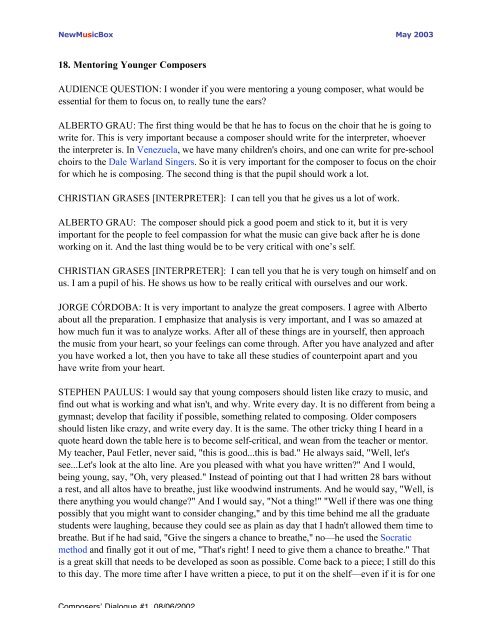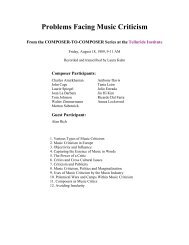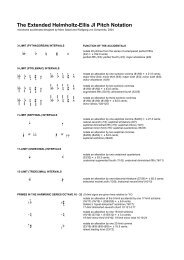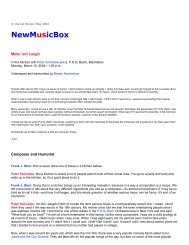Sixth World Symposium on Choral Music ... - NewMusicBox
Sixth World Symposium on Choral Music ... - NewMusicBox
Sixth World Symposium on Choral Music ... - NewMusicBox
You also want an ePaper? Increase the reach of your titles
YUMPU automatically turns print PDFs into web optimized ePapers that Google loves.
New<strong>Music</strong>Box May 2003<br />
18. Mentoring Younger Composers<br />
AUDIENCE QUESTION: I w<strong>on</strong>der if you were mentoring a young composer, what would be<br />
essential for them to focus <strong>on</strong>, to really tune the ears?<br />
ALBERTO GRAU: The first thing would be that he has to focus <strong>on</strong> the choir that he is going to<br />
write for. This is very important because a composer should write for the interpreter, whoever<br />
the interpreter is. In Venezuela, we have many children's choirs, and <strong>on</strong>e can write for pre-school<br />
choirs to the Dale Warland Singers. So it is very important for the composer to focus <strong>on</strong> the choir<br />
for which he is composing. The sec<strong>on</strong>d thing is that the pupil should work a lot.<br />
CHRISTIAN GRASES [INTERPRETER]: I can tell you that he gives us a lot of work.<br />
ALBERTO GRAU: The composer should pick a good poem and stick to it, but it is very<br />
important for the people to feel compassi<strong>on</strong> for what the music can give back after he is d<strong>on</strong>e<br />
working <strong>on</strong> it. And the last thing would be to be very critical with <strong>on</strong>e’s self.<br />
CHRISTIAN GRASES [INTERPRETER]: I can tell you that he is very tough <strong>on</strong> himself and <strong>on</strong><br />
us. I am a pupil of his. He shows us how to be really critical with ourselves and our work.<br />
JORGE CÓRDOBA: It is very important to analyze the great composers. I agree with Alberto<br />
about all the preparati<strong>on</strong>. I emphasize that analysis is very important, and I was so amazed at<br />
how much fun it was to analyze works. After all of these things are in yourself, then approach<br />
the music from your heart, so your feelings can come through. After you have analyzed and after<br />
you have worked a lot, then you have to take all these studies of counterpoint apart and you<br />
have write from your heart.<br />
STEPHEN PAULUS: I would say that young composers should listen like crazy to music, and<br />
find out what is working and what isn't, and why. Write every day. It is no different from being a<br />
gymnast; develop that facility if possible, something related to composing. Older composers<br />
should listen like crazy, and write every day. It is the same. The other tricky thing I heard in a<br />
quote heard down the table here is to become self-critical, and wean from the teacher or mentor.<br />
My teacher, Paul Fetler, never said, "this is good...this is bad." He always said, "Well, let's<br />
see...Let's look at the alto line. Are you pleased with what you have written?" And I would,<br />
being young, say, "Oh, very pleased." Instead of pointing out that I had written 28 bars without<br />
a rest, and all altos have to breathe, just like woodwind instruments. And he would say, "Well, is<br />
there anything you would change?" And I would say, "Not a thing!" "Well if there was <strong>on</strong>e thing<br />
possibly that you might want to c<strong>on</strong>sider changing," and by this time behind me all the graduate<br />
students were laughing, because they could see as plain as day that I hadn't allowed them time to<br />
breathe. But if he had said, "Give the singers a chance to breathe," no—he used the Socratic<br />
method and finally got it out of me, "That's right! I need to give them a chance to breathe." That<br />
is a great skill that needs to be developed as so<strong>on</strong> as possible. Come back to a piece; I still do this<br />
to this day. The more time after I have written a piece, to put it <strong>on</strong> the shelf—even if it is for <strong>on</strong>e<br />
Composers’ Dialogue #1, 08/06/2002





